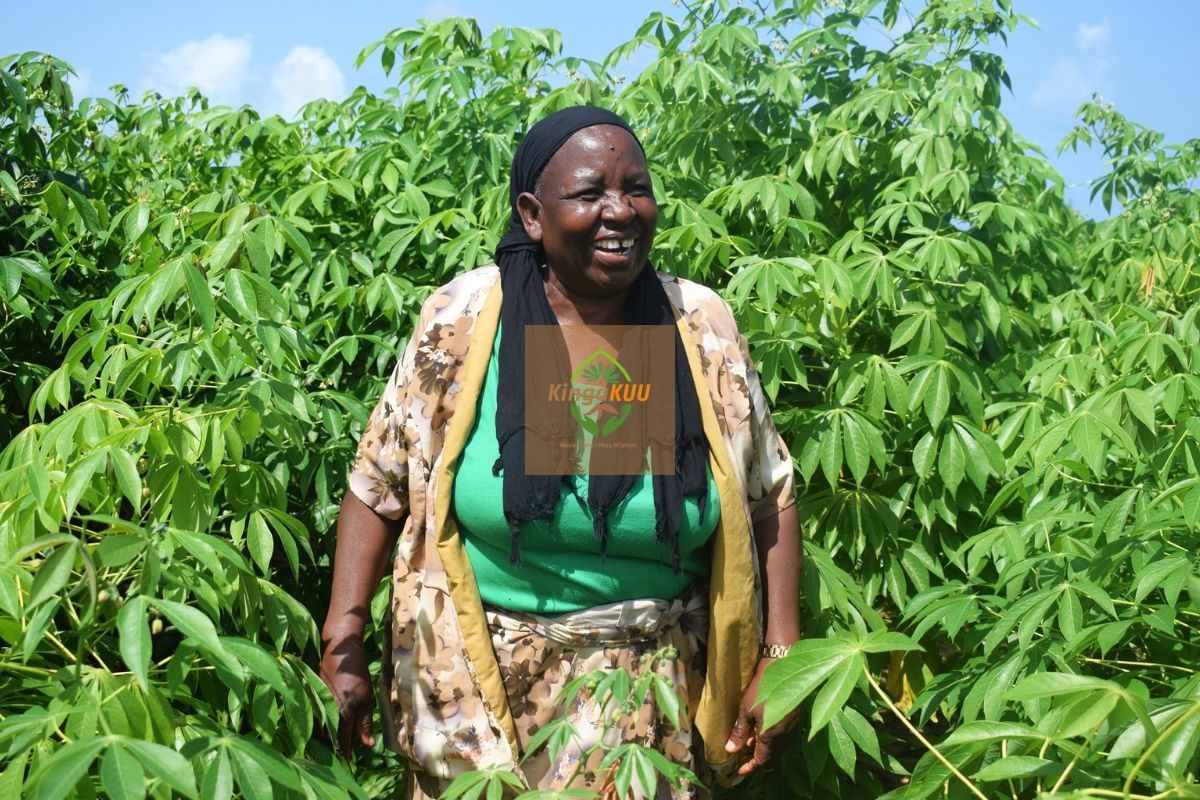A very energetic and vibrant Mrs. Patience Dhahabu Charo cannot hide her joy at the anticipated seed harvest she will get from her cassava seed farm in Mikingirini Village- Kilifi County
In the early 2000s, Patience Dhahabu who was then a station clerk at the Kilifi District Cooperative Union office was rendered jobless from her position as an office clerk through liquidation of the organization. At the time, Patience had six dependents and had to quickly think of ways to make an income to provide for her household. “I had to quickly think of a business to provide income for my family, luckily, My husband and I had some land and decided to discuss with him to allocate me land to venture fully into farming as a business” Patience decided to venture into small-scale vegetable farming a decision she says she has never regretted.
In 2013, Patience and other peer farmers in her community formed a farmer group “Chama” called Basi Mwangaza group Self Help Group and they ventured into the Cassava Seed Multiplication business as a group through an initiative by Kenya Agriculture and Livestock Research Organization-KALRO, though the cassava seed issued and planted were to diseases, they were characterized by a myriad of challenges from pests, diseases like Cassava Mosaic and Brown streak, inadequate rainfall affecting field establishment and germination rates and limited agronomic skills among member farmers. The group also faced Inadequate access to the market for cassava produce and group management dynamics. Patience describes the situation to have persisted through for a couple of years before she decided to venture in the seed business independently.

Patience’s first encounter with the VIRCA project was in October 2021 when she was identified as a Cassava Seed Entrepreneur in her village and visited for project information sharing and enrollment. Patience willingly took up the opportunity and started participating in organized business skills training, Good Agronomy Practices-GAP training, and other learning workshops through the project for example registration and certification to run a seed enterprise by Kenya Plant Health Inspectorate Services-KEPHIS. Patience was also among the CSEs selected to travel to Tanzania for a learning and mentorship trip from other well-established CSEs in the cassava seed multiplication business in Tanzania.
Through the training and support by the VIRCA project and partners, patience established a 1.5-acre demo farm at her home planting three improved and clean cassava seed varieties (Karembo, X-Mariakani and Micericeri) that she received from . Patience has since multiplied the seed and transplanted over 14,000 seed cuttings to 2.5 acres.
“Previously, I would plant my Cassava seed and leave it to grow until maturity, however, with the VIRCA project, I have learned how to identify characteristics of improved seed varieties that I get from seed breeder KALRO, I also continuously carry out farm scouting for pests and disease management and roguing of off-type and infected varieties”. Patience also received training in financial management, record-keeping, and marketing skills. “The project has also enabled me to keep good farming records, I have established networks with other fellow CSEs creating a platform for peer-to-peer learning”.
A key challenge experienced by Patience at the time of joining the project was a prolonged drought resulting to inadequate access to water for irrigation of her cassava seed farm at the planting stage, this threatened to wipe out her seed farm, however, through a matching grant, The VIRCA project sunk a borehole at her home that provided reliable water supply for irrigation.

The borehole has been of great help, we have observed more than 90% germination rate of the cassava seed planted due to irrigation. The borehole has also created employment opportunity for my 34 year old last born son, he has taken up vegetable farming using this water source and makes an average daily income of USD 5 to 10 from sale of vegetables to the local market. He is also supporting me in running the cassava seed enterprise and based on my old age, am happy I will have a successor” Patience laughs as she narrates.
From anticipated proceeds from the sale of improved cassava seeds to her community, Patience’s major goal is to set up a drip irrigation system in her farm to expand her cassava seed business and diversify to other agribusiness ventures. The drip irrigation system will also reduce irrigation cost which she says are high due to high labor costs in the region.
Patience also indicated a need for the project to create awareness on improved Cassava varieties and its Value to framers in the community to improve uptake of improved cassava seed varieties.
“Despite my previous conventional ways of farming Cassava, I have reaped benefits from Cassava seed business and used the proceeds to support my Husband In building our home where I have raised my 6 children, I know the potential of this business and I am happy that I will play a role in providing improved cassava seeds to farmers in my community which will in turn benefit their household with incomes and food. I encourage more farmers and especially youth to take up this venture”


